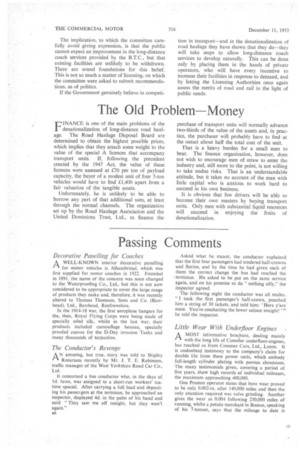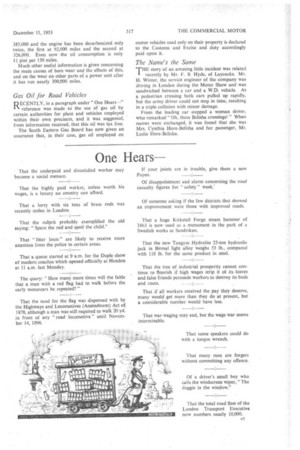Passing Comments
Page 40

Page 41

If you've noticed an error in this article please click here to report it so we can fix it.
Decorative Panelling for Coaches
A WELL-KNOWN interior decorative panelling for motor vehicles is Alhambrinal, which was first supplied for motor coaches in 1922. Founded in 1891, the name of the concern was soon changed to the Waterproofing Co., Ltd., but this is not now considered to be appropriate to cover the large range of products they make and, therefore, it was recently altered to Thomas Thomson, Sons and Co. (Barrhead), Ltd., Barrhead, Renfrewshire.
In the 1914-18 war, the first aeroplane hangars for the, then, Royal Flying Corps were being made of specially oiled silk, whilst in the last war, their products included camouflage hessian, specially proofed canvas for the D-Day invasion Tanks and many thousands of tarpaulins.
The Conductor's Revenge
AN amusing, but true, story was told to Shipley Rotarians recently by Mr. J.. T. E. Robinson, traffic manager of the West Yorkshire Road Car Co., Ltd.
It concerned a bus conductor who, in the days of ld. fares, was assigned to a short-run workers' teatime special. After carrying a full load and depositing his passengers at the terminus, he approached an inspector, displayed 4d. in the palm of his hand and said: "They saw me off tonight, but they won't again."
B6 Asked what he meant, the conductor explained that the first four passengers had tendered half-crowns and florMs, and by the time he had given each of them the correct change the bus had reached the , terminus. He asked to be put on the same service again, and on his promise to do "nothing silly," the inspector agreed.
The following night the conductor was all smiles. "I took the first passenger's half-crown, punched• him a string of 30 tickets, and told him: 'Here y'are mate. You're conducting the lower saloon tonight! ' " he told the inspector,
Little Wear With Underfloor Engines .
AMOST informative brochure, dealing mainly
with the long life of Cormier underfloor-engines, has reached us from Commer Cars, ltd., Luton. It is undoubted testimony to the company's claim for double life from these power units, which embody full-length cylinder plating with porous chromium. The many testimonials given, covering a period of five years, show high records of individual mileages, the maximum approaching 400,000.
One Preston operator states• that bore wear proved to be only 0.002-in. after 140,000 miles and then the only attention required was valve grinding_ Another gives the wear as 0.004 following 230,000 miles of running, whilst a potato merchant in Boston, speaking of his 7-tonner, says that the mileage to date is 385,000 and the engine has been decarbonized only twice, the first at 92,000 miles and the second at 326,000. Even now the oil consumption is only I pint per 150 miles.
Much other useful information is given concerning the main causes of bore wear and the effects of this, and on the wear on other parts of a power unit after it has run nearly 300,000 miles.
Gas Oil for Road Vehicles
RECENTLY, in a paragraph under "One Hears—" reference was made to the use of gas oil by certain authorities for plant and vehicles employed within their own precincts, and it was suggested, from information received, that this oil was tax free.
The South Eastern Gas Board has now given an assurance that, in their case, gas oil employed on motor vehicles used only on their property is declared to the Customs and Excise and duty accordingly paid upon it.
The Name's the Same
'THE story of an amusing little incident was related I recently by Mr. F. B Hyde, of Laycocks. Mr. H. Winter, the service engineer of the company was driving in London during the Motor Show and was sandwiched between a car and a W.D. vehicle. At a pedestrian crossing both cars pulled up rapidly, but the army driver could not stop in time, resulting in a triple collision with minor damage.
From the leading car stepped a woman driver, who remarked Oh, these Belisha crossings!" When names were exchanged, it was found that she was Mrs. Cynthia Hore-Belisha and her passenger, Mr. Leslie Hore-Belisha.




















































































































